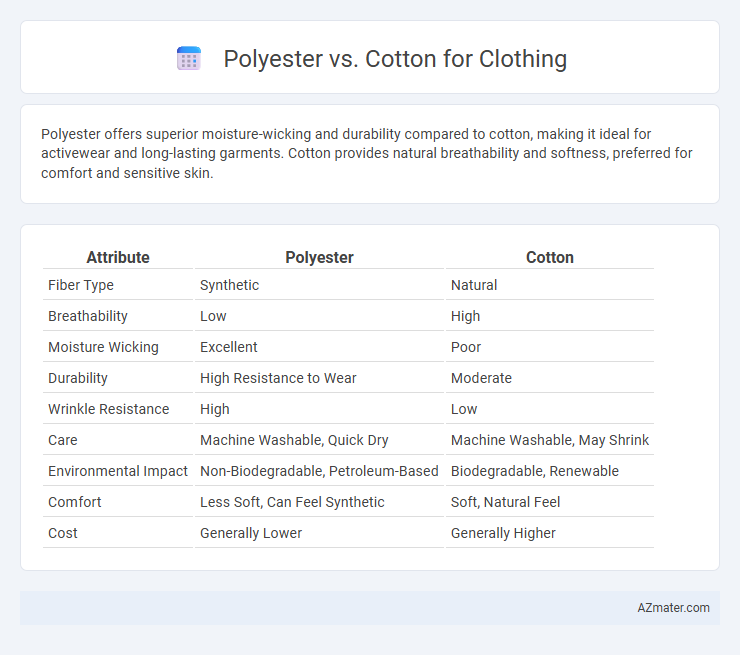Polyester offers superior moisture-wicking and durability compared to cotton, making it ideal for activewear and long-lasting garments. Cotton provides natural breathability and softness, preferred for comfort and sensitive skin.
Table of Comparison
| Attribute | Polyester | Cotton |
|---|---|---|
| Fiber Type | Synthetic | Natural |
| Breathability | Low | High |
| Moisture Wicking | Excellent | Poor |
| Durability | High Resistance to Wear | Moderate |
| Wrinkle Resistance | High | Low |
| Care | Machine Washable, Quick Dry | Machine Washable, May Shrink |
| Environmental Impact | Non-Biodegradable, Petroleum-Based | Biodegradable, Renewable |
| Comfort | Less Soft, Can Feel Synthetic | Soft, Natural Feel |
| Cost | Generally Lower | Generally Higher |
Introduction to Polyester and Cotton Fabrics
Polyester, a synthetic fiber derived from petroleum, offers exceptional durability, wrinkle resistance, and moisture-wicking properties, making it ideal for activewear and easy-care garments. Cotton, a natural fiber harvested from the cotton plant, provides breathability, softness, and excellent moisture absorption, which contributes to its widespread use in casual and comfortable clothing. Both fabrics serve distinct purposes in the fashion industry, with polyester excelling in longevity and performance, while cotton is favored for comfort and natural feel.
Key Differences Between Polyester and Cotton
Polyester is a synthetic fiber known for its durability, moisture-wicking properties, and resistance to wrinkles, shrinking, and fading, making it suitable for activewear and outdoor clothing. Cotton, a natural fiber, offers superior breathability, softness, and hypoallergenic qualities, providing comfort and moisture absorption ideal for everyday wear and sensitive skin. The key differences lie in polyester's synthetic origin and performance durability versus cotton's natural composition and comfort-focused attributes.
Comfort and Feel: Polyester vs Cotton
Cotton offers superior breathability and softness, making it highly comfortable for everyday wear and sensitive skin types. Polyester, known for its moisture-wicking properties, provides durability and retains shape but may feel less breathable and can trap heat during prolonged use. Choosing between polyester and cotton depends on the desired balance between comfort, breathability, and fabric performance in various climates.
Breathability and Moisture Management
Polyester excels in moisture management due to its hydrophobic fibers that wick sweat away from the skin, making it ideal for activewear and humid conditions. Cotton offers superior breathability, allowing air to circulate freely and providing a cooling effect, but it retains moisture longer, which can lead to discomfort during intense physical activity. Choosing between polyester and cotton depends on the balance of breathability and moisture-wicking needed for specific clothing applications.
Durability and Longevity Comparisons
Polyester fabric offers superior durability and resistance to wear compared to cotton, making it less prone to shrinking, stretching, and wrinkling over time. Cotton, while breathable and comfortable, tends to degrade faster with frequent washing and exposure to sunlight, resulting in a shorter lifespan. The synthetic fibers in polyester ensure longer-lasting clothing that maintains shape and color better than natural cotton fibers.
Care and Maintenance: Washing and Drying
Polyester clothing requires low-maintenance care, as it resists shrinking and wrinkles, allowing machine wash in cold water and tumble drying on low heat without damage. Cotton fabrics demand careful washing in warm or cold water to avoid shrinkage and should be air-dried or tumble dried on low to maintain softness and prevent wear. Proper care extends the lifespan of polyester by preserving moisture-wicking properties, while cotton benefits from gentle handling to retain breathability and natural fibers.
Sustainability and Environmental Impact
Polyester, derived from petroleum, poses significant environmental challenges due to its non-biodegradability and reliance on fossil fuels, contributing to microplastic pollution in oceans. In contrast, cotton, a natural fiber, is biodegradable but often requires intensive water use and pesticides, impacting soil health and water resources. Sustainable alternatives like organic cotton and recycled polyester aim to reduce environmental footprints by minimizing chemical inputs and promoting material reuse.
Allergies and Skin Sensitivities
Polyester often causes irritation or allergic reactions in people with sensitive skin due to its synthetic fibers that trap heat and moisture, creating an environment conducive to itchiness and rashes. Cotton, a natural fiber known for its breathability and softness, is generally hypoallergenic and less likely to aggravate skin conditions such as eczema or dermatitis. Choosing cotton clothing can significantly reduce the risk of allergic reactions and enhance comfort for individuals prone to skin sensitivities.
Cost and Affordability: Which Fabric Wins?
Polyester generally costs less than cotton due to its synthetic manufacturing process, making it a more affordable option for budget-conscious consumers. Cotton tends to be pricier because it is a natural fiber that requires extensive farming and processing, which increases production costs. Brands often choose polyester for mass-produced clothing to keep prices low while cotton is favored for premium, breathable garments despite the higher expense.
Best Uses: Choosing Polyester or Cotton for Different Clothing
Polyester excels in activewear and outerwear due to its moisture-wicking properties, durability, and wrinkle resistance, making it ideal for sports and outdoor activities. Cotton is preferred for casual wear and everyday clothing because of its breathability, softness, and natural fiber comfort, perfect for warm weather and sensitive skin. Blended fabrics combine polyester's strength and cotton's comfort, offering versatile options for both performance and casual use.

Infographic: Polyester vs Cotton for Clothing
 azmater.com
azmater.com